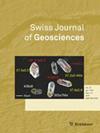关于通过参与性重力建模挑战制约巴尔穆奇亚橄榄岩体(意大利伊夫雷亚-维尔巴诺区)的开放数据集的报告
IF 2.6
2区 地球科学
Q3 GEOSCIENCES, MULTIDISCIPLINARY
引用次数: 0
摘要
巴尔穆奇亚橄榄岩在地球表面露出了相对较新的地幔岩石,因此引起了地质学家和地球物理学家的兴趣。该露头是一个千米级的地貌,但其深度范围却没有得到充分的成像。我们的目标是通过三维重力建模,为该岩体所代表的密度异常形状提供新的约束条件。为了避免个人或方法上的偏见,我们在此发出邀请,呼吁大家参与建模。我们公开提供所有必要的输入数据:预处理重力数据、地质图、现场岩石密度和数字高程模型。我们将与所有参与者共同比较和分析预期的反演结果。通过这种方法,我们可以得出巴尔穆奇亚橄榄岩体的形状以及相关的不确定性。这项集体努力将有助于在 DIVE 项目框架内,在该地区准备科学钻孔的现场勘测工作。本文章由计算机程序翻译,如有差异,请以英文原文为准。
Report on an open dataset to constrain the Balmuccia peridotite body (Ivrea-Verbano Zone, Italy) through a participative gravity-modelling challenge
The Balmuccia peridotite exposes relatively fresh mantle rocks at the Earth’s surface, and as such it is of interest for geologists and geophysicists. The outcrop is a kilometre-scale feature, yet its extent at depth is insufficiently imaged. Our aim is to provide new constraints on the shape of the density anomaly this body represents, through 3D gravity modelling. In an effort to avoid personal or methodology bias, we hereby launch an invitation and call for participative modelling. We openly provide all the necessary input data: pre-processed gravity data, geological map, in situ rock densities, and digital elevation model. The expected inversion results will be compared and jointly analysed with all participants. This approach should allow us to conclude on the shape of the Balmuccia peridotite body and the associated uncertainty. This crowd effort will contribute to the site surveys preparing a scientific borehole in the area in frame of project DIVE.
求助全文
通过发布文献求助,成功后即可免费获取论文全文。
去求助
来源期刊

Swiss Journal of Geosciences
地学-地质学
CiteScore
4.50
自引率
12.90%
发文量
21
审稿时长
>12 weeks
期刊介绍:
The Swiss Journal of Geosciences publishes original research and review articles, with a particular focus on the evolution of the Tethys realm and the Alpine/Himalayan orogen. By consolidating the former Eclogae Geologicae Helvetiae and Swiss Bulletin of Mineralogy and Petrology, this international journal covers all disciplines of the solid Earth Sciences, including their practical applications.
The journal gives preference to articles that are of wide interest to the international research community, while at the same time recognising the importance of documenting high-quality geoscientific data in a regional context, including the occasional publication of maps.
 求助内容:
求助内容: 应助结果提醒方式:
应助结果提醒方式:


